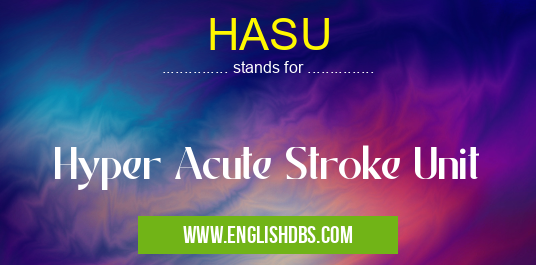What does HASU mean in HEALTHCARE
Hyper Acute Stroke Unit (HASU) is a specialized medical facility dedicated to the rapid and comprehensive assessment and treatment of acute ischemic stroke (AIS), which is a type of stroke caused by a blockage in a blood vessel supplying blood to the brain. HASUs provide immediate and advanced care to patients experiencing stroke symptoms, with the goal of minimizing brain damage and improving outcomes.

HASU meaning in Healthcare in Medical
HASU mostly used in an acronym Healthcare in Category Medical that means Hyper Acute Stroke Unit
Shorthand: HASU,
Full Form: Hyper Acute Stroke Unit
For more information of "Hyper Acute Stroke Unit", see the section below.
» Medical » Healthcare
What is a HASU
HASUs are typically located in hospitals with comprehensive stroke centers and are staffed by a multidisciplinary team of healthcare professionals, including neurologists, neurosurgeons, neuroradiologists, nurses, and rehabilitation specialists. The unit is equipped with advanced imaging technology, such as CT and MRI scanners, to rapidly diagnose stroke and determine the appropriate treatment.
Functions of a HASU
HASUs provide various essential functions, including:
- Rapid assessment and diagnosis: Patients suspected of having a stroke are immediately assessed by a neurologist and undergo imaging tests to confirm the diagnosis and determine the location and severity of the stroke.
- Personalized treatment: Based on the diagnosis, patients receive tailored treatments, such as thrombolytic therapy (clot-busting drugs), mechanical thrombectomy (physically removing the clot), or endovascular therapy (treating the blockage using minimally invasive techniques).
- Monitoring and support: Patients are closely monitored in the HASU, where vital signs, neurological status, and treatment response are continuously evaluated. The unit is equipped with specialized monitoring equipment to detect any changes in the patient's condition.
- Rehabilitation: Once the acute phase of the stroke has passed, patients may receive rehabilitation services within the HASU to facilitate recovery and improve functional outcomes. This includes physical therapy, occupational therapy, and speech therapy.
Essential Questions and Answers on Hyper Acute Stroke Unit in "MEDICAL»HEALTHCARE"
What is a Hyper Acute Stroke Unit (HASU)?
A HASU is a specialized medical unit dedicated to providing immediate and intensive care for patients experiencing acute stroke symptoms. It is typically located within a hospital and staffed by a team of stroke specialists, including neurologists, nurses, and other healthcare professionals.
What is the difference between a HASU and a regular stroke unit?
HASUs offer a higher level of care compared to regular stroke units. They are equipped with advanced imaging and monitoring equipment, which allows for rapid diagnosis and treatment. HASUs also have dedicated staff who are specially trained in stroke care and can provide 24/7 monitoring and support.
Who is eligible for admission to a HASU?
Patients who are experiencing acute stroke symptoms, such as sudden weakness or numbness on one side of the body, difficulty speaking or understanding speech, or vision problems, are typically eligible for admission to a HASU. The decision to admit a patient to a HASU is made by a stroke specialist after assessing their symptoms and medical history.
What are the benefits of being treated in a HASU?
Treatment in a HASU can improve outcomes for stroke patients by:
- Providing rapid access to specialized care and treatment
- Reducing the risk of complications, such as bleeding or infection
- Improving the chances of a full or partial recovery
- Providing support and education for patients and their families
What are the typical treatments provided in a HASU?
The treatments provided in a HASU may vary depending on the type and severity of the stroke. Common treatments include:
- Thrombolytic therapy (clot-busting drugs)
- Mechanical thrombectomy (surgical removal of a blood clot)
- Antiplatelet or anticoagulant medications
- Blood pressure control
- Monitoring and management of other medical conditions
Final Words: HASUs play a crucial role in stroke care by providing specialized and timely interventions that can significantly improve the chances of a favorable recovery after stroke. Their advanced facilities, expert staff, and comprehensive approach to stroke management make them essential components of a comprehensive stroke care system.
HASU also stands for: |
|
| All stands for HASU |
